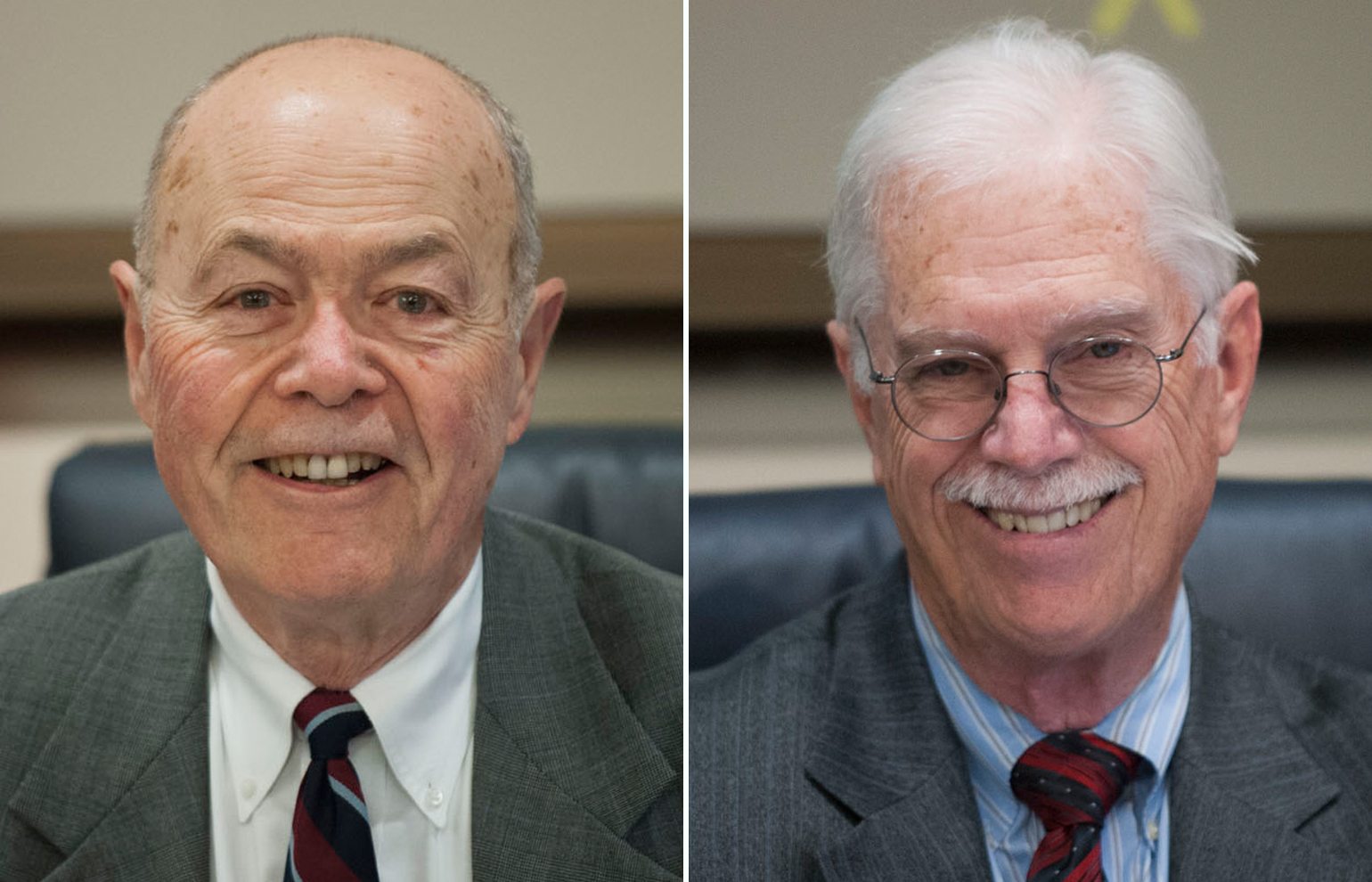Two Port of Vancouver commissioners put themselves at risk of violating the state’s open meetings law last week in a scene that played out at a biweekly labor roundtable in Vancouver.
Commissioners Brian Wolfe and Jerry Oliver both attended Friday’s breakfast at HomeTown Buffet. Wolfe attends the Labor Roundtable of SW Washington meetings regularly, but Oliver was a surprise visitor. Having a majority of commissioners present without advance public notice when port business is being discussed can be a violation of the Open Public Meetings Act.
Both commissioners had come to tell community members about Tuesday’s public hearing on the Vancouver Energy oil terminal lease. Vancouver Energy General Manager Jared Larrabee also attended the meeting.
Local labor leader and roundtable organizer Ed Barnes, a former Clark County commissioner, said he sensed the potential for trouble in complying with the meetings law when Oliver arrived. Barnes warned the commissioner — who is running as a Republican to represent the 17th District in the state House — not to talk about port business.
“I told him that up front, that he wasn’t there to talk about anything other than he’s running for the Legislature. Then the first thing out of his mouth is something about the port,” said Barnes, who cut Oliver’s statement short.
Wolfe, an attorney who represents local governments, said he didn’t know that Oliver would attend but personally had no concerns.
“Do I think it’s a violation? No,” Wolfe said Friday. “I think there’s an argument that it wasn’t, and I think there could be an argument that it could be.”
Oliver also denied having broken the meetings law, despite having spoken publicly about port business, and said he and Wolfe didn’t speak to one another at the meeting.
“I’m here because I care for the working men and women of Clark County,” Oliver said by phone Friday, recalling his statement. “I wanted to encourage as many of you as possible, if you care for economic development for our county, to be at this meeting.”
The port has faced court challenges over the meetings law for holding allegedly improper closed-door meetings that led to commissioners approving the oil terminal lease in 2013. Project opponents asserted that seven such executive sessions violated state law; a judge rejected five of those claims.
The environmental groups who sued the port were granted a limited appeal from the state Supreme Court on March 31.
As for Friday’s incident, it’s perfectly legal for two commissioners to be in the same place at the same time without notice “provided they take no action,” according the Open Public Meetings Act.
“Action means the transaction of the official business of a public agency by a governing body including but not limited to receipt of public testimony, deliberations, discussions, considerations, reviews, evaluations, and final actions,” reads the law.
A lawyer with the Washington Coalition for Open Government said the commissioners’ public statements raise questions, though she said that without witnessing the meeting it’s hard to come to a conclusion.
“It certainly does raise a question about the public’s opportunity to participate in the decision-making process if two of the three members are in any way deliberating or announcing a position before the public hearing has taken place,” said Katherine George, a coalition board member and chair of its legal committee.
If commissioners know they are going to be together, they can put out a notice of a meeting that might include the phrase “no final action will be taken.” Such cautionary notices are common for ground-breaking ceremonies or other public gatherings, at least among some governmental bodies. On Monday, for example, the Battle Ground city clerk put out a “notice of a potential quorum” because several city councilors will attend the Country Shindig dance and veterans memorial fundraiser on Friday.
No such notice was issued by the port about the labor meeting.
The port’s actions Wednesday, again involving the Vancouver Energy project, also raised public meetings law concerns. Oliver told The Columbian that he had talked with port CEO Todd Coleman — and he suspected the two other commissioners had as well — about Vancouver Energy’s request to amend its lease for port property.
Discussions between a majority of elected officials and a third-party decision-maker are known as a serial meeting. Even though the elected officials don’t meet together, information can be passed through to constitute a virtual meeting without public notice.
The port denied a serial meeting took place.
“Those were opportunities for the commissioners to talk individually with legal counsel,” said port spokeswoman Abbi Russell. “Two of our three commissioners were able to take this opportunity to ask questions of legal counsel about the existing lease and lease amendment. Todd was in the meetings to answer questions from the staff perspective. No deliberation or action took place in these meetings.”
Commissioners and staff meeting one-on-one is fine, said Coalition for Open Government president Toby Nixon, but there is a fine line on what can be shared.
“Where you really get into dangerous territory –and in my opinion would constitute a serial meeting — would be if the ‘person in common’ conveys information from one member of the board to the others,” said Nixon, who is also a Kirkland city councilor.
The Legislature this year increased the fines for breaking meetings law to $500 for a first violation and $1,000 for repeat offenders. It had been $100 since the law was passed in 1971.
“This update of the law will mean those officials who knowingly and repeatedly violate our open meetings law will now face a real penalty — one strong enough to protect the public’s right to know,” said state Sen. Pam Roach, R-Sumner, a sponsor of the bill.




